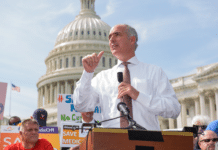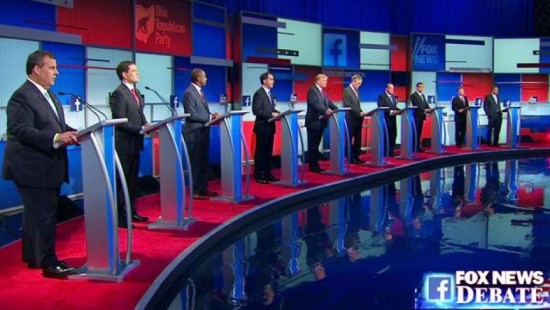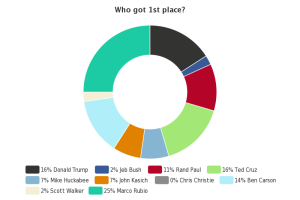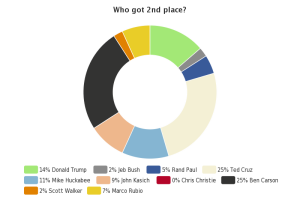 Last week’s Fox News debate between the top ten GOP contenders for President had a whopping 24 million viewers and resulted in fireworks between the candidates and the moderators who asked questions ranging from NSA spying to abortion. While Republican primary voters continue to study the field, campaigns are busy building organizations that will win delegates and eventually determine the nominee.
Last week’s Fox News debate between the top ten GOP contenders for President had a whopping 24 million viewers and resulted in fireworks between the candidates and the moderators who asked questions ranging from NSA spying to abortion. While Republican primary voters continue to study the field, campaigns are busy building organizations that will win delegates and eventually determine the nominee.
Minnesota’s a state that hasn’t voted to elect a Republican president since 1972 when it went for Richard Nixon. While it’s a strong player on the Democratic side, Republicans in the state are seldom courted by top-tier candidates. In 2012, Mitt Romney had no presence at all in the state and large Minnesota donors had to pitch in the money to provide yard signs. It was a big change from 2008, when John McCain had call centers and a bigger change from 2004 when George W. Bush had a large-scale state operation. The results showed, Minnesota Republicans lost both the state house and senate in 2012.
Will 2016 put Minnesota Republicans in the same position? It depends on how Republican leaders navigate the waters facing a strong top-of-the-ticket opponent in Hillary Clinton. Minnesota is a state with the 2nd largest percentage of working women in the country, (only Washington D.C. ranks higher,) and state Democrat leaders like DFL party chair Ken Martin and Governor Mark Dayton are already working to elect Clinton. Clinton, thus far, only has one main rival in Vermont Senator Bernie Sanders who recently polled at 32% to Clinton’s 50%. On the other side, Republican party chair Keith Downey is remaining neutral in a much larger field of candidates.
The same Minnesota poll released by Public Policy Polling before last week’s GOP debate showed Republican voters in the state support Wisconsin Governor Scott Walker (19%), followed by businessman Donald Trump (18%), former Florida Governor Jeb Bush (15%) pediatric neurosurgeon Ben Carson (11%), Texas Senator Ted Crus (7%), former Arkansas Governor Mike Huckabee (6%) and Kentucky Senator Rand Paul (5%) and Florida Senator Marco Rubio (5%) The poll had a 5.2% +/- margin of error and was conducted with both primary voters and other registered voters.
The Star Tribune reported last week, that “of more than a dozen Minnesota Republicans interviewed for this story, none could produce the name of a single person in Minnesota currently supporting Trump.” The observation signals a disconnect between party leaders and their voters.
Meanwhile, less popular candidates have found key support. Even though he isn’t polling well at this point, Rubio has former gubernatorial candidate Jeff Johnson signed on to head his campaign here. The Florida Senator also has another strong Minnesota ally in consultant and former chair of the state Republican Party, Pat Shortridge, who has previously worked with Rubio.
Another candidate who isn’t polling well, is Rick Santorum, but he has organizers at work in Minnesota under his Patriot Voices group and stated support from former Michele Bachmann campaign manager Andy Parrish. His organization won the state’s caucus night straw poll in 2012.
Senator Rand Paul, whose father Ron had strong support in Minnesota when he ran for President in 2012, has state Senator Branden Petersen and others who will work for caucus turnout.
Scott Walker, who leads the polls, appears to be the best positioned for the caucus night less than seven months away. House Speaker Kurt Daudt just signed on to head his campaign in Minnesota. Conservative legislators like Steve Drazkowski and Dave Thompson, have both praised Walker, an indication that he can unite the moderate and more conservative sides of the party.
Jeb Bush has the support of GOP kingmaker and D.C. lobbyist Vin Weber as well as organizer and consultant Lonny Leitner .
Donald Trump has no announced organization in the state, but hired Rick Santorum’s former Iowa campaign manager to run operations in the Hawkeye state which plays a bigger role on the path to the nomination.
Neither Carson, Cruz, nor Huckabee currently have state operations. Neither does former CEO Carly Fiorina, whose strong performance in the “bottom tier” GOP debate last week, could propel her in to the polls.
Minnesota will have a total of 38 delegates to the Republican National convention in 2016– ranked 29th in the country. While the state may not have a large total of delegates to donate to the count, Minnesota Republican caucus-goers have a good sense of winners and losers. In 2000, caucus goers strongly supported George W. Bush, who went on to win the nomination. But in 2004, they picked Mitt Romney over John McCain, and in 2008 they picked Santorum over Romney. In each case, a strong ground game produced the results.
In reaction to the success of Ron Paul supporters in taking delegates in the 2012 Presidential election, the Republican National Committee changed the rules for Minnesota. Delegates will now be proportionately allocated based on the caucus night straw poll results. Caucus has been moved back to March 1st, 2016, in hopes that the state could have a stronger influence as a “Super Tuesday” player, but since delegates won’t be awarded on a “winner-takes-all” basis, the impact is diluted.
But in a crowded field with a Republican base disenchanted with its leadership, a state like Minnesota with a penchant for populists could be a bellwether in the GOP primary process.
Update:
Here are the results of our Alpha News Facebook poll taken after the debate:














